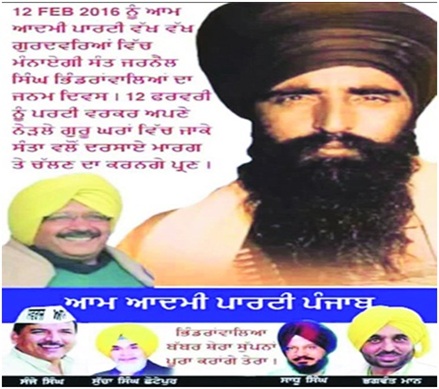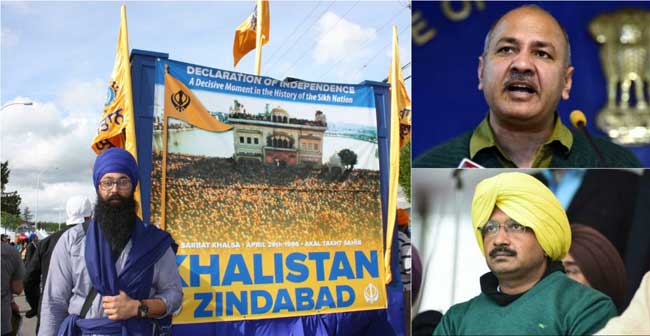In the beginning of November this year, Army Chief Gen. Bipin Rawat had said, “Punjab has been peaceful but because of these external linkages, attempts again are being made to revive insurgency in the state.” He further added, “We have to be very careful.” “Let us not think that Punjab (situation) is over. We cannot close our eyes to what is happening in Punjab. And, if we do not take early action now, it will be too late.” This goes on to show that there is a constant threat of radicalism and revival of insurgency in Punjab. In that backdrop, recent attack on Nirankari Bhawan in Amritsar becomes a very sensitive issue. On Sunday, in a tragic incident that struck Amritsar, two assailants threw grenades at the Nirankari Bhawan which resulted in the death of 3 people while 20 others were injured. More importantly, According to a ‘India Today’ report, hardliner Sikh groups had started their terror activities in Punjab almost 40 years ago on April 13, 1978 and that too on the eve of Baisakhi by attacking the Nirankari Bhawan in Amritsar.
For almost two decades, Punjab suffered the curse of strife and terrorism. Policies of Congress party and the politics played by the Akalis soaked the fertile soil of the state with blood of its own people. Kidnappings, murder, and ransom became the everyday ritual of the state. Terrorists demanded a separate homeland for Sikhs- Khalistan but on the other hand, the Armed Forces went all out to crush the secessionist forces. An entire generation of Punjab was lost in the wanton bloodshed. With a combination of political measures, response by armed forces and the voice of the civil society, normalcy returned in Punjab. At the dawn of the new century, peace and prosperity returned to Punjab. The dark days were over; however, in recent times it has been seen that some political parties for their cheap political gains are trying to appease the same forces of terrorism and radicalism that once had almost devastated the entire Punjab.
Former state DGP of Punjab, KPS Gill had said that AAP is providing a platform to radicals in Punjab. Gill said, “Radical Sikh Diaspora is very disappointed over what they could not achieve earlier. Now with Aam Aadmi Party there is influx of them from foreign countries. They think this is the opportunity which is very good for them and they would be able to create a big base from which to operate”. KPS Gill had played a pivotal role in ending terrorism in Punjab.
Last month, in a sting operation carried out by the Republic TV, it has come to light that AAP received funds from a banned Khalistani group. A group member- Gurcharan Singh- of once banned Dal Khalsa claimed that his group campaigned and even funded Aam Aadmi Party during the 2017 Punjab state assembly elections. He accepted the same during the ‘Debate at 10’ with Republic TV’s editor-in-chief Arnab Goswami. When Arnab Goswami asked Gurcharan Singh whether his group funded the AAP or not, Gurcharan Singh replied, “Aam Aadmi Party was just a tool. It was a meaningless tool. It is an irrelevant party. Aam Aadmi Party is an irrelevant party brought in Punjab by rogue. We used the AAP as tool to expose the political system and Electoral machines. AAP got 90 seats in Punjab. We used them as a tool to expose how fraud the electoral system is in the state.”
AAP got funding from banned Khalistani organisation during Punjab elections pic.twitter.com/rcxn9wn2fj
— Rishi Bagree (@rishibagree) October 4, 2018
The Dal Khalsa group does not recognize the authority of the Indian constitution. The group’s spokesperson, Kanwarpal Singh in January 2017 had said, “We boycott elections under Indian dispensation.” He further added, “We are a votary of an independent, sovereign Punjab. We want the Sikhs be given the right of self-determination in this regard.”
When Gurcharan Singh was again asked whether he actually funded and campaigned for the party, he replied, “I am not denying it, I am not denying it. We used them as tool. I am not denying it. The whole system is fraud (sic).”
Earlier in the sting operation carried out by the Republic TV, he had said, “Look at Punjab. AAP won the elections. They won 95 seats. We were on the ground. Campaigning for the party. We funded the party to see what a campaign makes a difference. And it does make a difference. People voted for AAP. They did not win because of the EVM (sic.)”
Time and again AAP leaders have shown soft corners for the Khalistanis. This year in June, AAP Member of Parliament from Patiala, Dharamvir Gandhi came out in the support of the Khalistan referendum in Punjab. In an objectionable statement inciting susceptible elements, he stated that people have the democratic and legal right to demand a separate homeland.
The Khalistan referendum is a seditious campaign controlled by extremist Sikh elements in the United States and Canada. These secessionist elements profess that they seek to ‘liberate’ Punjab and Sikhs from India and create a separate nation of Khalistan. It has come to light that the campaign has been getting supports from Pakistan’s intelligence agency-cum terror outfit, ISI.
Again in June, the then senior leader of AAP and Punjab opposition leader Sukhpal Khaira had supported a referendum for Khalistan. Khaira reportedly said, “I support the Sikh referendum 2020 movement as Sikhs have the right to demand justice against atrocities suffered by them”. Just few days ago, AAP has fired Sukhpal Khaira from the party.
The AAP chief Arvind Kejriwal had stayed in the house of former chief of Khalistan Liberation Front (KLF) – Gurwinder Singh. Gurwinder Singh is accused of inciting communal riots during the years when terrorism was at its peak in Punjab. He was even jailed for committing murder and many other heinous crimes.
Mr @ArvindKejriwal I strongly condemn the statement of your LOP @SukhpalKhaira supporting Referendum 2020 that aims for Punjab to secede from the Indian Union. Please clarify your stand on this & ask your partymen to act responsibly. Do see what this Referendum stands for👇🏻 pic.twitter.com/cX8MOsVR1w
— Capt.Amarinder Singh (@capt_amarinder) June 16, 2018
In the run-up to Punjab state assembly elections, during rallies of the AAP in the state, attended by MP Bhagwant Mann and Punjab Affairs-in charge, Sanjay Singh frequently featured portraits of Jarnail Singh Bhindrawale.

AAP had even fielded Khalistan supporters as its candidates. For instance, Jarnail Singh, who was an AAP candidate from West Delhi in Lok Sabha elections, has addressed Khalistan rallies abroad.
Irresponsible attitude of some parties towards in order to establish themselves in the state politics of Punjab provided a chance of revival to radical elements. According to the India Today report, in the past two years, seven religious leaders have been murdered by Khalistani groups which also include Mata Chand Kaur, wife of the former head of the Namdhari sect, late Jagjit Singh, who was shot by two bikers in Ludhiana on April 3, 2016. In May, Ravinder Gosain, an RSS member, was shot dead outside his residence in Ludhiana when he was returning from the Shakha. While investigating the murder of an RSS leader in Punjab, the NIA has come to learn that it was part of a larger conspiracy to destabilize Punjab and bring terrorism back to the state. In January 2016, RSS leader Naresh Kumar was also shot by two bikers.
The main objective behind all this is to revive the era of anarchy, disorder, and terrorism in Punjab. There has been a constant attempt to revive the Khalistan movement in Punjab. For this, a large amount of money is illegally dumped in Punjab to revive the Khalistan movement. Despite knowing how dangerous and harmful this can be for the country to revive a Frankenstein monster like the Khalistan movement, there are still some politicians who are irresponsibly associating with Khalistani radicals and giving them tickets to contest in the elections. It is better for the country, as well as for democracy, if politicians like Kejriwal steer clear of such fundamentalists.




























